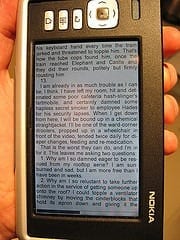It is no secret that many people in the Big Six publishing houses do not understand or do not care for the lending of ebooks.
This has made the shift from physical to digital very difficult for libraries. Libraries have been a staple of many communities and those people’s ability to have access to new books to read. Now that many readers are going digital, libraries are finding it harder and harder to keep up with demand, primarily because of publishers holding out.
Over at Joe Konrath‘s blog, we learn of the plight of one such library system in Houston, Texas. Mike and Linda, librarians from the Harris County Public Library, explain to Joe that trying to work with the publishing industry can be a big headache for libraries.
Libraries are not able to purchase all of the eBooks we would like to purchase due to publisher and author concerns about copyright protection in the digital format. Only two of the big six publishers will sell eBooks to libraries, and those pricing models either limit us to a low number of checkouts or charge us more than twice the retail price for a book. Very few picture books are available for us to purchase, even though small children are a large part of our customer base and we often use digital books in storytimes. With adult fiction titles, we can’t always offer complete series because of format availability or publisher restrictions. Some publishers would even like to implement a plan that would force people to come to the library to check out eBooks, rather than being able to do it online, which kind of defeats the purpose.
Right off the bat, with only two of six publishers willing to sell ebooks to libraries, we have a big problem. Unfortunately for the libraries, buying and lending ebooks is nothing like the physical world in which a library could just pop over to Walmart or get on Amazon and order a couple copies of the latest hit. With ebooks, they have to deal with licensing issues and other restrictions from publishers that would block any such ability in the digital realm.
Second, there is the lack of availability of ebooks in a variety of formats. If a person comes in without a supported ereader, then that person is left unserved by the library, something that most librarians do not like. What is worse is that person who wanted to read a book had to walk away empty handed, thus limiting the exposure of the book and author to a potential new fan.
All these problems and more limit the ability of libraries to spread the love of books, which also limits the ability for authors to gain the needed exposure and resulting sales.
So what does the library have to offer? Book borrowing habits are changing, mainly because of eBooks. People are more open to impulse browsing and discovery of new authors and titles and the library provides the collection and staff to aid them in this discovery. Once they’ve discovered a new favorite, the quest for reading gratification leads to backlist purchases. (We speak from personal experience on this.)
This ability to try a new author or series without having to spend money is something that we have supported many times. It is one way to battle obscurity as a creator. Without the ability for readers to try out a new author for free, that author may lose out on potential sales. Libraries are important tools in gaining that exposure and publishers are blocking them from doing their job. So what is a library to do? In this case, skip the publisher and go straight to the author.
Public libraries have always selected print books based on professional reviews and public demand. This doesn’t always work with eBooks. With eBooks, we have to focus on availability and public interest. We are also rethinking our relationship with self-publishing. Many libraries, such as ours, are now looking for ways to purchase eBooks directly from authors and independent publishers.
This is the way to go. We have learned over the years that it is the gatekeepers that tend to be the roadblock toward better exposure and better terms for readers and authors alike. By skipping the Big Six and any other publisher that does not want to allow lending on fair terms, these libraries can expand their collections and better serve the public.
In response to this change in plan from this library, Joe Konrath has decided on some very favorable terms for his books, which he hopes other authors adopt as well.
Blake and I are willing to sell our entire ebook catalog to the Harris County Public Library, and to any other libraries that are interested, under these terms:
1. Ebooks are $3.99
2. No DRM.
3. The library only needs to buy one ebook of a title, and then they can make as many copies as they need for all of their patrons and all of their branches.
4. The library owns the rights to use that ebook forever.
5. The library can use it an any format they need; mobi, epub, pdf, lit, etc. And when new formats arise, they’re free to convert it to the new format.
In short, the library buys one copy, and never has to buy it again.
Why is he willing to make such favorable terms?
via TechDirt
The Latest Streaming News: Lending of ebooks updated minute-by-minute
Bookmark this page and come back often
Latest NEWS
Latest VIDEO








